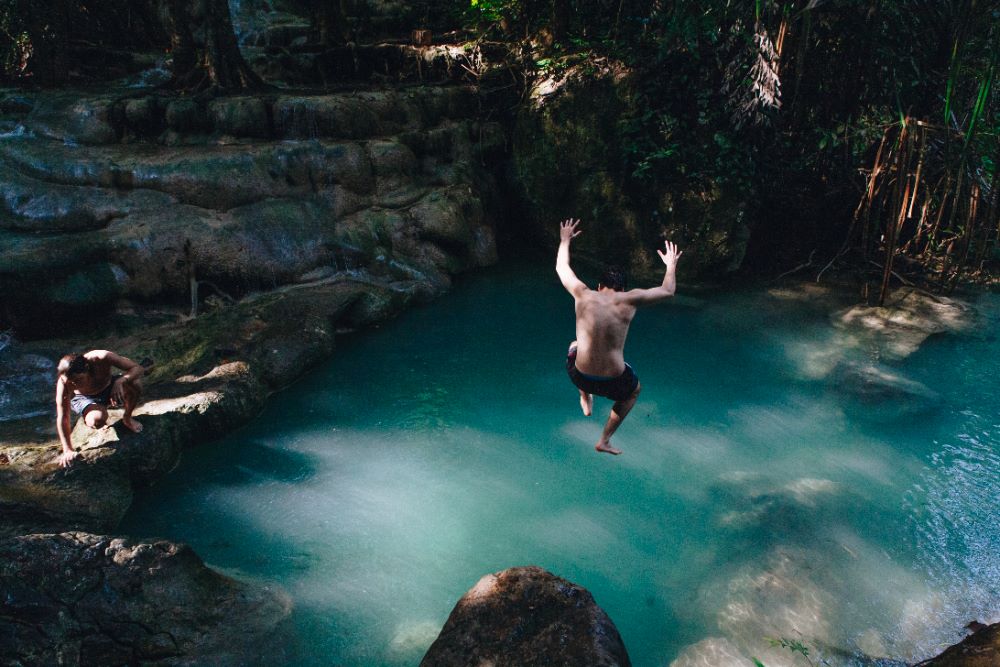
If you are new, freediving is a sport that connects with the world underwater. Freediving isn’t just about holding your breath, it’s about exploring the silent life underneath, finding yourself, and embracing the beauty of nature.
If you are stepping into the world of freediving, you must know the difference between cenote freediving and ocean freediving, which is a recurring topic. While both are incredible experiences, they do differ in their overall experience. Ready to find out what sets them apart?
Let’s dive in!
The Beauty of Cenote Freediving
When you are about to go cenote freediving, you can expect to step into lush green nature with towering trees and surprisingly discover a crystal-clear sinkhole. That’s cenote for you. It’s a natural pit filled with freshwater, mostly connected to underground river systems.
Mexico’s Yucatán Peninsula is quite a popular cenote, offering a surreal freediving experience. The stillness of the water, the penetrating sunlight into the depths of the water, and the limestone formations make the cenote freediving otherworldly.
This freediving experience is quite surreal! One of the freedivers shared their journey, saying, “The water was so clear that it felt like floating in space. As I descended, the temperature dropped slightly, and a beam of light followed me. The experience is worth a lifetime.”
Features of Cenote Freediving
To gain a better understanding, here are some features of cenote freediving:
Crystal-Clear Water
Cenotes are popular for their exceptionally clear waters, providing divers visibility, often stretching over 100 feet. The clarity allows for a surreal and almost weightless feeling as if you are floating through space.
Geological Formation
As you descend, you will encounter stunning stalagmites, stalactites, and underwater caverns. This makes the dive feel like an exploration of all together and another world. This intermingling of light and shadow on these formations adds to the overall mystical ambiance.
Peaceful Surroundings
The stillness and silence of the underwater world create an almost meditative environment for freedivers. The absence of currents and the quiet world enhances the feeling of being alone with nature.
Changing Light Conditions
As you dive deeper, the sunlight follows you through the openings above and creates mesmerizing beams of light that illuminate the water. This changing light makes the experience dreamlike.
Cooler Water Temperatures
The water temperature in cenote freediving tends to be cooler compared to ocean dives, offering a refreshing contrast to the warmth of the surrounding air. The drop in temperature adds a sensory element to the experience.
Spiritual Connection
Several cenote freedivers find the experience to be deeply spiritual. The sense of weightlessness, the beauty underwater, and the connection with nature provide a profound sense of inner peace.
Magnetism of Ocean Freediving
Ocean freediving is a vast and dynamic experience. Whether you are diving along coral reefs, exploring underwater caves, or venturing into the open blue, the ocean acts as an ever-changing canvas.
The ocean is where marine life thrives and where the element of unpredictability adds to the thrill. One of the freedivers shared their experience, saying “Ocean freediving felt like I was part of the sea, weightless, free, and completely at peace.”
Key Features of Ocean Freediving
Here are the key features of ocean freediving that make it such a unique activity:
Endless Exploration
The ocean offers vast, open water. This expansive environment can feel limitless, but it also introduces a level of unpredictability, where each dive may offer entirely different conditions and experiences.
Dynamic Water Conditions
In contrast to the calm, still waters often found in cenotes freediving, ocean freediving requires dealing with changing tides, currents, and waves. This dynamic environment brings excitement and challenge but also demands more skill and adaptability from the diver.
Freedom of Movement
The open ocean offers freedom in all directions, allowing divers to explore without boundaries. This sense of freedom contrasts with cenote freediving, where the structure of the water body can be more limiting in terms of movement.
Breath Control Under Pressure
While both ocean and cenote freediving require excellent breath control, the conditions in the ocean can be more challenging. Stronger currents and deeper dives demand a heightened focus on relaxation and breathing.
Varied Water Temperatures
Depending on the location and depth, ocean temperatures can vary significantly. From warm surface waters to cooler depths, ocean divers must adapt to shifting conditions.
Low Environmental Impact
Like cenote freediving, ocean freediving is an eco-friendly activity. However, due to the larger, more complex ecosystems in the ocean, the environmental impact can vary depending on location. While both environments encourage sustainability, the ocean’s scale requires particular attention and awareness from divers.
Comparing the Cenote Freediving & Ocean Freediving
While both cenote freediving and ocean freediving have their own charm, the experience can differ significantly based on a few factors.
1. Environment
- Cenotes: Enclosed, freshwater environments with stable conditions.
- Oceans: Open, saline environments with variable conditions.
2. Challenges
- Cenotes: Limited light in deeper areas and psychological challenges of enclosed spaces.
- Oceans: Dealing with currents, waves, and sometimes unpredictable marine life.
3. Accessibility
- Cenotes: Often located inland, requiring a trek or drive to reach.
- Oceans: Coastal access is generally more straightforward, though some dive sites need a boat.
4. Skill Development
- Cenotes: Great for improving depth technique and breath control in a calm setting.
- Oceans: Builds strength due to varying conditions.
The Best of Both Worlds
Why choose one when you can experience both? Many freedivers explore cenotes for their meditative qualities and head to the ocean for adventure and variety. For example, if you are visiting Mexico, you can easily dive in cenotes one day and head to the Caribbean Sea the next.
Concluding Note
Cenote freediving and ocean freediving each offer a unique experience. Whether you are drawn to the calmness of cenotes or the energy of the ocean, both experiences can deepen your love for freediving.
So, which will it be for you? Let us know in the comments below!
Featured Image by rawpixel.com on Freepik







